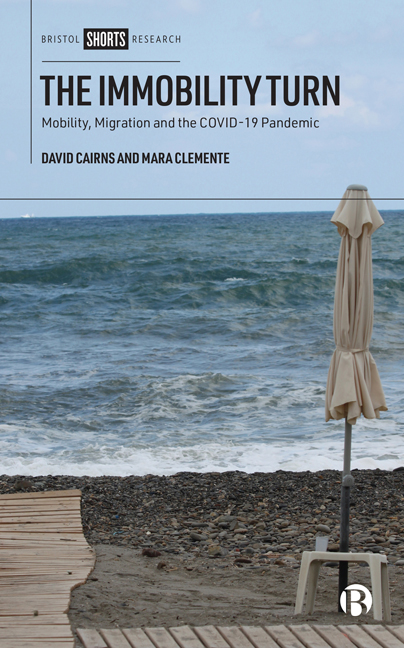Book contents
- Frontmatter
- Contents
- List of Figures
- About the Authors
- one COVID-19 and the Immobility Turn
- two Theorizing the Immobility Turn
- three From Overtourism to Undertourism, and Back Again
- four International Student Mobility and Immobility
- five Maintaining Migration during a Pandemic
- six Mobility after an Immobility Turn
- Notes
- References
- Index
two - Theorizing the Immobility Turn
Published online by Cambridge University Press: 18 January 2024
- Frontmatter
- Contents
- List of Figures
- About the Authors
- one COVID-19 and the Immobility Turn
- two Theorizing the Immobility Turn
- three From Overtourism to Undertourism, and Back Again
- four International Student Mobility and Immobility
- five Maintaining Migration during a Pandemic
- six Mobility after an Immobility Turn
- Notes
- References
- Index
Summary
In this chapter, we recognize the importance of prior scholarship on the meaning of the multiplication of mobility, sometimes rebranded as ‘mobilities’ (Urry, 2007). We note the importance of expansionism during the pre-pandemic era, especially but not exclusively in regard to tourism. From a positive point of view, expansion meant the diversification of international mobility, opening up new possibilities for personal gratification in the leisure sphere and, more instrumentally, widening the potential field of opportunities for education, training and employment. This implies that the shift towards mobilities was not entirely superficial, especially when there were possibilities for life-enriching social and cultural exchange to take place, echoing ideas from research on lifestyle migration (see, for example, Benson and O’Reilly, 2009, 2016). Less publicized was the negative impact made by mobilities on the natural environment, and the disruption to social life that could take place within host communities where visitor numbers had expanded to unmanageable levels (see also Urry and Larsen, 2011).
On this latter point, paraphrasing Oscar Wilde, we might say that there was a tendency for travellers to kill the thing they loved.1 Tourism in particular had an unfortunate habit of homogenizing destinations, with the existing sense of place displaced by overcrowding and the erection of unsightly infrastructure – ugly new airports, carbuncle cruise ship terminals, noisy cafés and ghastly pop-up bars. The desire for expansion has nevertheless continued during the pandemic, albeit with a degree of adaptation. We have, for example, witnessed the emergence of hybrid travel experiences with remote working from different destinations growing in visibility, suggesting closer alignment between tourism and labour migration among the highly skilled.
Acknowledging the positive and negative aspects of the expansion of mobility, we argue in this chapter that in addition to higher levels of human circulation being economically and existentially important, there has been change in the consumption of mobility on which vested interests became dependent – an orientation viewed as desirable due to its apparent profitability. We might even say that approaches to mobility, and the defence of a global system of maximized levels of population exchange, came to represent an integral aspect of capitalist development, though one that also globalized risk and precarity. The pandemic threatened this position and created new vulnerabilities for travellers.
- Type
- Chapter
- Information
- The Immobility TurnMobility, Migration and the COVID-19 Pandemic, pp. 21 - 33Publisher: Bristol University PressPrint publication year: 2023



